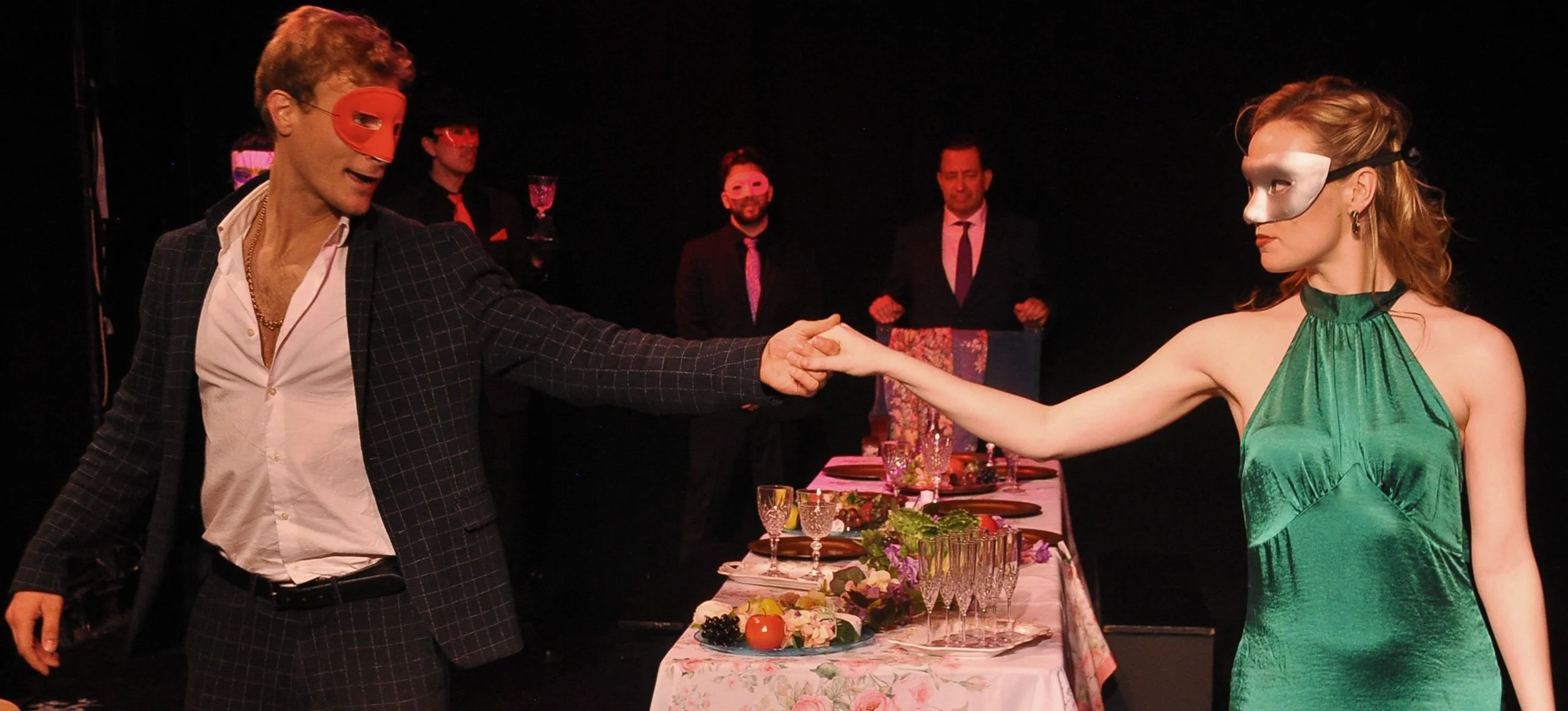Artur Ignatenko as Benedick and Aislinn Evans as Beatrice in Much Ado About Nothing at the Gene Frankel Theater.
The skirmish of wits between Shakespeare’s Beatrice and Benedick takes on a modern spin in a new production of Much Ado About Nothing, set in 1940s Italy. Director Thomas G. Waites utilizes the unflagging energy of a rotating cast from Waites TGW studio to fire up Shakespeare’s romantic comedy.
This is Shakespeare’s play on love, betrayal, bachelorhood, and female purity, a crowd-pleaser since it debuted in the late 1590s. The key strength here is its cast’s youthful brio—the majority of performers are in their early twenties.
Dillon John Collins as Claudio (left) and Jake Minevich as Benedick in Much Ado About Nothing.
Now that the war is over, a banquet has been laid for celebration. Elle Kunnos de Voss’s handsome set is dominated by a long banquet table at center stage, complete with champagne flutes, dinner plates, and various bowls of fruit. At the celebration, which includes a masked ball, the brave but quiet Claudio has changed from soldier to lover, his sights set on Hero, the daughter and heir of Leonato (David Manganiello), the governor of Messina. His soldier-friend Benedick (Artur Ignatenko) has arrived with him in Messina.
At the banquet, a disguised Don Pedro (Jacque Coqueran), the Prince of Aragon, will court Hero (Stephanie Londono) on behalf of Claudio (Dillon John Collins). But, in sharp contrast to Claudio, he is not wooing but waging a merry war of wits with his old flame Beatrice (Aislinn Evans), Leonato’s niece. In fact, Beatrice confides to Don Pedro that she and Benedick once exchanged hearts:
Indeed, my lord, he lent it me awhile; and I gave him use for it, a double heart for his single one: marry, once before he won it of me with false dice, therefore your grace may well say I have lost it.
Stephanie Londono (left) as Hero and Evans as Beatrice in Much Ado About Nothing. Photographs by Rob Klein.
While Cupid’s arrows seem to have missed their mark with Benedick and Beatrice, gossip hits the bull’s-eye in this comedy. Beatrice and Benedick’s friends stage little plays within the play, in which each is made to believe that the other is secretly in love with her/him. The result is that their repressed feelings of love surface, and they demonstrate all the traditional signs of love that they once mocked in others.
This affords some of the funniest and most charming moments in the play. Take for instance, Benedick’s speech that explains his sudden change of heart from being a bachelor to future married man:
I may chance have some odd quirks and remnants of wit broken on me because I have railed so long against marriage; but doth not the appetite alter? … When I said I would die a bachelor, I did not think I would live till I were married.
The self-deprecating title is rich in meaning. For starters, “nothing” and “noting” were likely pronounced the same in Shakespeare’s day, and the play’s first audiences would have enjoyed the inevitable wordplay between them. Then there are Benedick and Beatrice, who pretend indifference to each other, and yet will ultimately—and literally—note their true romantic sentiments in letters that will be exposed by their friends. Benedick is the first to point out the discrepancy between what he formerly has said and the truth: “A miracle! Here's our own hands against our hearts.” Last, not least, “nothing” in Shakespeare’s day was a slang term for the female sexual organs.
There’s original music (Cedric Allen Hills) in this production that both enhances the play’s aristocratic decorum and advances the plot. In fact, the character Balthazar (Hills), a musician who attends Don Pedro and sings, “Sigh No More, Ladies, Sigh No More,” accompanies himself on a keyboard:
Sigh no more, ladies, sigh no more.
Men were deceivers ever,
One foot in sea, and one on shore,
To one thing constant never.
Both Evans’s smart and loyal Beatrice (the actress’s classical ballet training shows) and Ignatenko’s arrogant but likable Benedick are immensely entertaining as they banter. Although neither character registers as a sophisticate, the actors get the love-hate chemistry between the two just right.
Collins’s reserved Claudio and Londono’s amenable Hero are at their actorly best in the first wedding scene that embroils them in a mini-tragedy, triggered by Hero’s supposed infidelity.
Surge’s villainous Don John, the bastard brother of Don Pedro, though highly watchable, does a whiff too much moustache twirling, not trusting in Shakespeare’s language to do its theatrical magic. Even though the character might not have the heft of Richard III, he is a forerunner to Iago, jealous of Claudio’s success in war and love. All in all, this production of Much Ado, though not flawless, showcases an enthusiastic cast of up-and-comers in the theater world.
Faith American Brewing Company and Kelsey Grammer’s production of Much Ado About Nothing runs at the Gene Frankel Theatre (24 Bond St.) through June 30. Evening performances are at 8 p.m. Wednesday through Saturday; matinees are at 3 p.m. Sunday. For more information, visit genefrankeltheatre.com.
Playwright: William Shakespeare
Director: Thomas G. Waites
Set: Elle Kunnos de Voss
Lighting: Thomas R. Gordon





